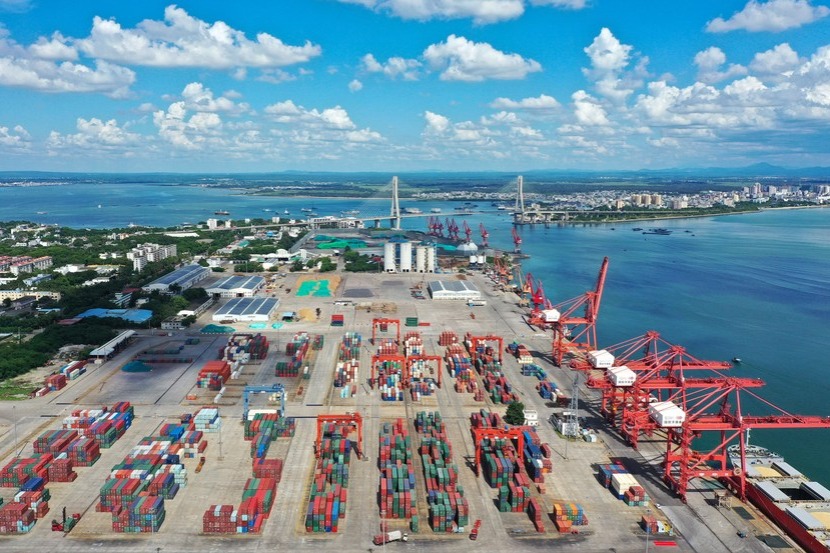Coalition of 'climate willing' partners needed
By Najib Saab | China Daily Global | Updated: 2025-11-06 09:05

Climate action is facing unprecedented challenges, due to the rise of populist movements led by the United States administration. This puts the 30th Conference of the Parties to the United Nations Framework Convention on Climate Change, or COP30, which starts in Brazil on Thursday, in danger of collapse, unless radical changes in approach are reached soon, including forging new coalitions.
It is now high time to evaluate the state of negotiations and the contribution of various countries to global climate governance. It is also worth asking whether climate is still a prime issue on the agenda, and what role various groups of countries are playing in advancing climate action.
According to successive reports of global scientific panels, climate change is an indisputable fact, and the cost of preemptive action is much less than that of inaction. The impact of climate change is disproportional, as countries that have historically contributed less to carbon emissions are the most vulnerable to the impacts. In Arab countries, the most devastating impacts include elevated water scarcity, expansion of arid land and sea-level rise.
Having realized this, these countries started to take climate negotiations seriously, as the challenges hit them hard. The defensive attitude that dominated in the past led some Arab negotiators to align with the climate deniers' camp. This has changed in recent years, as a shift was made from merely blocking decisions as a reaction to initiatives advanced by other players, to proactive participation.
Some Arab countries, mainly the United Arab Emirates, Saudi Arabia, Morocco, Jordan and Egypt, have been promoting their own concrete initiatives, covering carbon neutrality, advancing renewables, energy efficiency and climate finance, thus strengthening their negotiating position.
The Arab countries have also widened the range of international partnerships in energy, and technology in general, forging joint ventures with a broader spectrum of countries, mainly China.
Since climate change became an indisputable fact, Arab negotiators have shifted to defend the right of their countries to fair transition. It is worth noting that fossil fuel exporters are not the only parties trying to gain more time to harness natural resources that contribute to climate change. Leading meat producers, a major source of greenhouse gas emissions, fight as hard to delay an abrupt cutting of emissions, advocating an approach of "phasing down" over "phasing out". These are not mere linguistics, but legitimate concerns to get a better deal when compromises are reached.
It is most important not to lose focus, and to choose the right global partners, putting an emphasis on strengthening regional cooperation among Arab countries as a unified front in climate negotiations.
Leaders cannot be taken seriously if they talk about climate justice while ignoring human rights. Equally, the big impact of new US climate policies against world consensus cannot be taken lightly. The US has even threatened to impose punitive action on countries that support climate measures considered by the US administration to be obstructing free US trade. The most recent was putting intense pressure on vulnerable countries to vote against measures that would impose a carbon emissions levy on shipping companies. Sure things are slowing down, and the world is in danger of impeding climate momentum and focus.
The positive aspect is that, in spite of this unprecedented war against global consensus, climate remains prominent on the agendas of most countries and regional groups. It is notable that the European Union countries, even though risking delays due to economic and security challenges, are still committed to serious climate action. China has increased its climate commitments, including faster transition to renewable energy, becoming the world's biggest producer of solar panels, wind turbines and electric vehicles.
Besides leadership on cleaner energy, China has expanded its green cover, including forests, now capable of absorbing 1.2 billion metric tons of carbon dioxide annually. Arab countries, including oil exporters, have strengthened their diversification programs, expanding their investments in efficient, clean and renewable energy. This happens while the US is defying the world by going against all norms in favor of financial gains, regardless of consequences for the future of humanity. Political wisdom should lead to choosing the right side of history, not to risk losing competitive advantage.
Oil producing countries are right to explore all options that might allow them to achieve carbon neutrality, through better efficiency, carbon capture and storage, and other advanced technologies, in order to avoid an abrupt phasing out of fossil fuels. However, achieving carbon neutrality is imperative for the world, including the Arab region, which is particularly vulnerable to the challenges posed by climate change.
Carbon neutrality means reducing carbon generation in the first place, which ultimately requires a transition away from fossil fuels extraction and consumption. The question is how to set fair terms and a workable agenda.
If US bullying of other countries and disregard for international law remain unchecked, the world order will risk fatal collapse. The climate negotiations in Brazil can only be saved by forging a coalition of the "climate willing", based on broad agreement on the principles.
China, the EU and Arab countries, including oil exporters, can form the core of this climate front.
The author is secretary-general of the Arab Forum for Environment and Development and editor-in-chief of Al-Bia Wal-Tanmia magazine.
The views do not necessarily reflect those of China Daily.
























